"366 Meditations on Wisdom, Perseverance, and the Art of Living: Featuring new translations of Seneca, Epictetus, and Marcus Aurelius"

Back with another season of Book Babbles! You can check out the first 50 here.
Here we have a classic book containing various meditations, thoughts and writings from philosophers, thinkers and emperors of time gone past. They've all been put together in this book for a daily dose of wisdom…
What binds them together is Stoicism, or at least coming at it from a Stoic angle. This not being the 'emotionless' state that many associate with this word and concept, but the actual way of thinking and acting practiced by many in the old Roman and Greek times, as well as by modern day leaders in business and the like. We'll delve more into that below.
Ryan Holiday is the author and one such proponent of this way of living. He has written several books, all coming from this angle.
So here we have passages from Aurelius, Seneca, Epictetus and more with some of their timeless wisdom which is as applicable today as it was back in their time. These ideas don't get old, they're forever pillars and something we can all ponder on.
Each chapter represents one day of the year, and is a passage from one of the greats mentioned (or others of a similar ilk), and then expanded on by Holiday to paint a picture for our modern understanding.
Let's jump in…
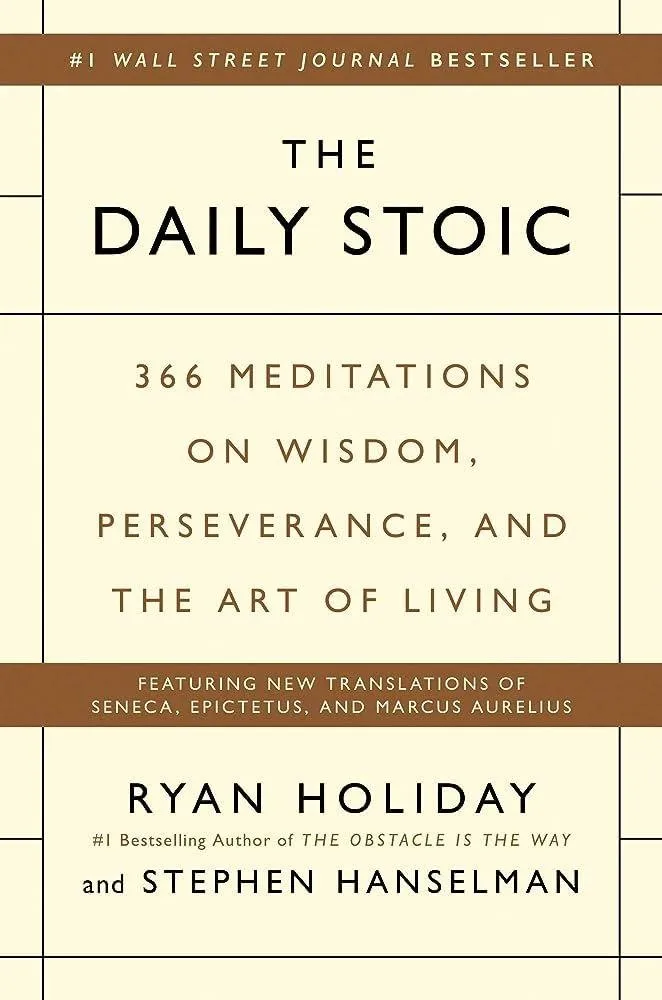
Some great quotes from the book, followed by my thoughts…
Except to the most avid seekers of wisdom, Stoicism is either unknown or misunderstood. Indeed, it would be hard to find a word dealt a greater injustice at the hands of the English language than “Stoic.” To the average person, this vibrant, action-oriented, and paradigm-shifting way of living has become shorthand for “emotionlessness.”
Here we have this common misconception straight away addressed. Not being 'stoic' - almost like a criticism - meaning no emotion and not facing life, or sometimes positively meaning keeping a calm head.
This is more about deep and profound thinking and behaviours that lead to a virtuous life. So there's a grander side that needs to be understood, and for those that want to, applied!
Captain James Stockdale
The Stockdale Paradox was named after the above captain. This was from when he was a prisoner of war in Vietnam. Whilst it's great to be optimistic, you don't want to head into delusion, which is what Stockdale found with some of his fellow inmates.
He would have associates in that POW camp who would believe they'd be out by Thanksgiving, then Christmas, then Easter and so on. Those times would all come and go, and those folks were left disillusioned and heartbroken, and many of them succumbed as they had unrealistic ideas.
The ones who survived were the people who were more realistic. They maintained that they were going to get out eventually, but that it would be a number of years before that happened. This was a more pragmatic approach and served them far better.
Always be optimistic and positive, sure, but careful not to stray too far and not face the reality of what you're dealing with. That way you can face the situation and deal with what's in front of you in the best way.
Stoicism was a school of philosophy founded in Athens by Zeno of Citium in the early third century BC.
Info on where it all began.
The philosophy asserts that virtue (meaning, chiefly, the four cardinal virtues of self-control, courage, justice, and wisdom) is happiness, and it is our perceptions of things—rather than the things themselves—that cause most of our trouble.
Now we get into the juice. The way of 'happiness' is to be found in virtuous thoughts and behaviour… as well as shaping our perceptions and how we react as opposed to any events in and of themselves.
The single most important practice in Stoic philosophy is differentiating between what we can change and what we can’t. What we have influence over and what we do not.
A central tenet is knowing what you can control and what you can't. This is so important to identify, but then apply. Once you know what is in your sphere of control, you can then take actions accordingly. Anything outside, then needs to be left.
“All you need are these: certainty of judgment in the present moment; action for the common good in the present moment; and an attitude of gratitude in the present moment for anything that comes your way.” —MARCUS AURELIUS, MEDITATIONS, 9.6
Marcus with some of his thoughts on how to think and be.
Control your perceptions. Direct your actions properly. Willingly accept what’s outside your control.
The point here is to willingly accept.
Not just begrudgingly accepting that 'shit happens' and attempting to move on, but actively grateful and almost as if you're glad it happened as it's serving you some sort of purpose.
That could be that it was for the greater good, or giving you a chance to practice those virtues.
begin with an end in mind.
As with anything, you need to see things from the end and act in the present. In order to plan or to see a situation work out the way you wish, you have to have that target in mind and work your way back. Same for the Stoics as with most ideas around this area.
The Stoics seek steadiness, stability, and tranquility—traits most of us aspire to but seem to experience only fleetingly. How do they accomplish this elusive goal? How does one embody eustatheia (the word Arrian used to describe this teaching of Epictetus)?
Equilibrium. Seeking and maintaining that state and not being thrown off.
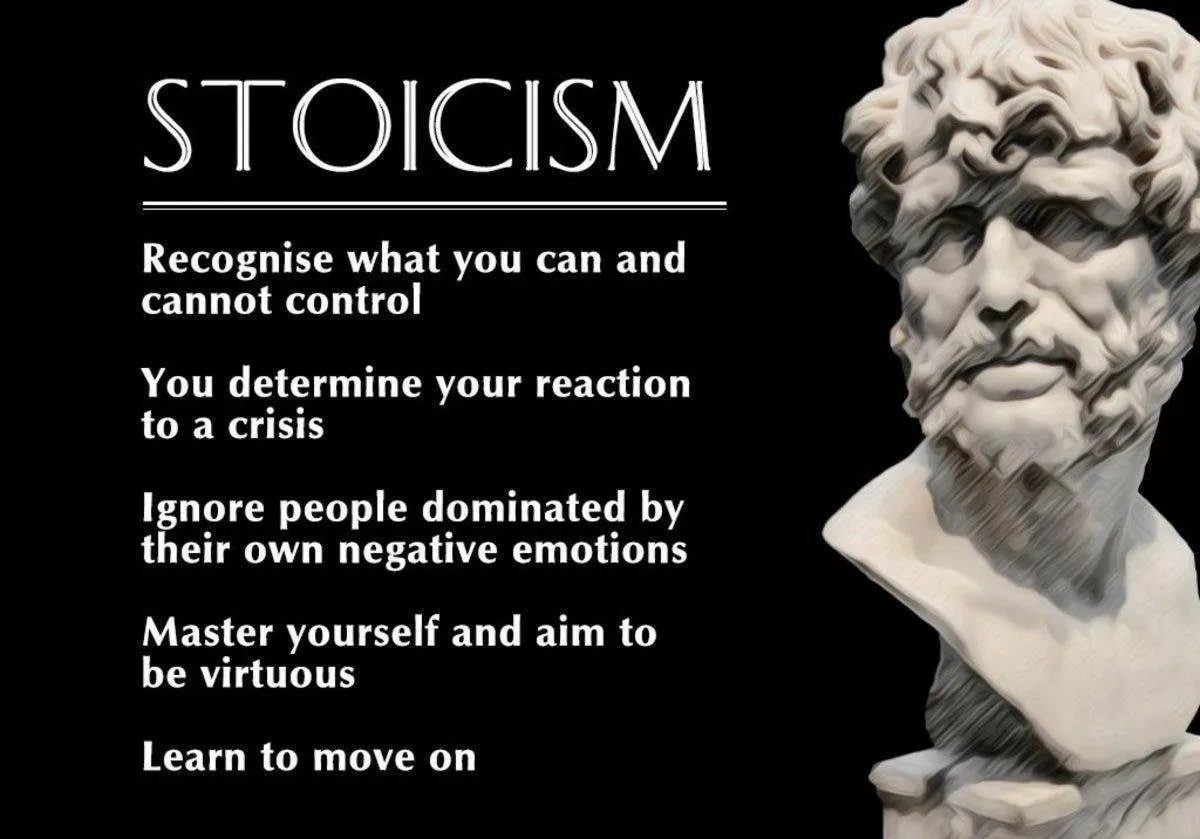
Epictetus is reminding you that serenity and stability are results of your choices and judgment, not your environment.
And that comes down to you. Serenity doesn't come from outside events, and can only come from within, despite whatever happens 'out there'.
According to the Stoics, the circle of control contains just one thing: YOUR MIND.
As stated, it's all about controlling the controllable… and the main instrument in all this is the one between your ears. It begins and ends with a person's mind and how they use it.
As Viktor Frankl puts it in The Will to Meaning, “Man is pushed by drives but pulled by values.”
Frankl sums this up well, and also in his classic book Man's Search for Meaning which we've covered here.
In Seneca’s essay on tranquility, he uses the Greek word euthymia, which he defines as “believing in yourself and trusting that you are on the right path, and not being in doubt by following the myriad footpaths of those wandering in every direction.” It is this state of mind, he says, that produces tranquility.
And this ties in with focus and not being taken off track by shiny objects. Find your truth and follow that path… that'll be the road to tranquility (and 'euthyimia').
Marcus’s Meditations
Meditations from Aurelius is a book worth reading in its own right. I have it on my Kindle but never completed it. Has a certain 'style' which may make it awkward to read, which is why a book like this one is good with its further analysis.
“baking bread splits in places and those cracks, while not intended in the baker’s art, catch our eye and serve to stir our appetite”
The imperfections make it what it is and adds to the spice of it all. Reminds me of a Japanese concept where if a vase breaks, they piece it back together with gold attaching the broken pieces, thus making it an even more valuable object (and with more character).
But in all circumstances—adversity or advantage—we really have just one thing we need to do: focus on what is in our control as opposed to what is not.
Back to what we can and can't control. So important and often forgotten (or not applied intelligently). We have to stop, assess where we are in that spectrum, then take any required actions… or step away.
We can reignite and restart whenever we like.
Every day is an opportunity. It's not a Monday or new year thing, but everyday… and even throughout the day we can simply start again.
The idea is to take some time to look inward and examine. Taking that time is what Stoics advocated more than almost anything else.
Like with many of these philosophies, it's about looking inward first and foremost, then the outside will follow.
At the end of each day he would ask himself variations of the following questions: What bad habit did I curb today? How am I better? Were my actions just? How can I improve?
Continuous improvement… applying the concept of Kaizen and purposely evaluating where they're at and what needs to be done. So an assessment of these and similar questions morning and at night.

Warren Buffett, whose net worth is approximately $65 billion, lives in the same house he bought in 1958 for $31,500.
Not all rich people believe in lavish displays. It's partly what made them - and kept them - rich but also it's where they're comfortable and don't feel the need to show off or give themselves extra burden for the sake of it.
The more things we desire and the more we have to do to earn or attain those achievements, the less we actually enjoy our lives—and the less free we are.
Ties in a lot with Buddhism. The Buddhists believe desire is suffering, or at least the attachment to desires which causes you to go astray.
If there’s a central message of Stoic thought, it’s this: impulses of all kinds are going to come, and your work is to control them, like bringing a dog to heel. Put more simply: think before you act. Ask: Who is in control here? What principles are guiding me?
Maintaining a calm control. Observing the situation, assessing, and calmly acting upon that. Not being driven by wild, animal impulses but pausing and doing right for all.
the things we fear or dread, we blindly inflict on ourselves.
What we focus on we tend to attract, and that of course includes our fears and helps to make them come to being.
The next time someone gets upset near you—crying, yelling, breaking something, being pointed or cruel—watch how quickly this statement will stop them cold: “I hope this is making you feel better.” Because, of course, it isn’t.
Anyone acting in that way doesn't want to be, and they're always coming from a place of anger, fear or hurt within themselves. They're to be pitied to a degree and best to distance from them… but there are times when a little nudge can help snap them out of it!
Thomas Jefferson once joked in a letter to John Adams, “How much pain have cost us the evils which have never happened!”
We fear the unknown, and mostly the things we feared never happen and some random stuff we never even thought of springs up and we have to deal with it on the fly.
Let’s not let emotion get in the way of kathêkon, the simple, appropriate actions on the path to virtue.
I've highlighted this for another Greek word and concept to add to our repertoire.
“Remember to conduct yourself in life as if at a banquet. As something being passed around comes to you, reach out your hand and take a moderate helping. Does it pass you by? Don’t stop it. It hasn’t yet come? Don’t burn in desire for it, but wait until it arrives in front of you. Act this way with children, a spouse, toward position, with wealth—one day it will make you worthy of a banquet with the gods.” —EPICTETUS, ENCHIRIDION, 15
This is just a great quote. Acting appropriately and patiently, and with grace and respect for yourself and others. The plate is coming; carry on with your business and have a nibble when the time is good and proper.
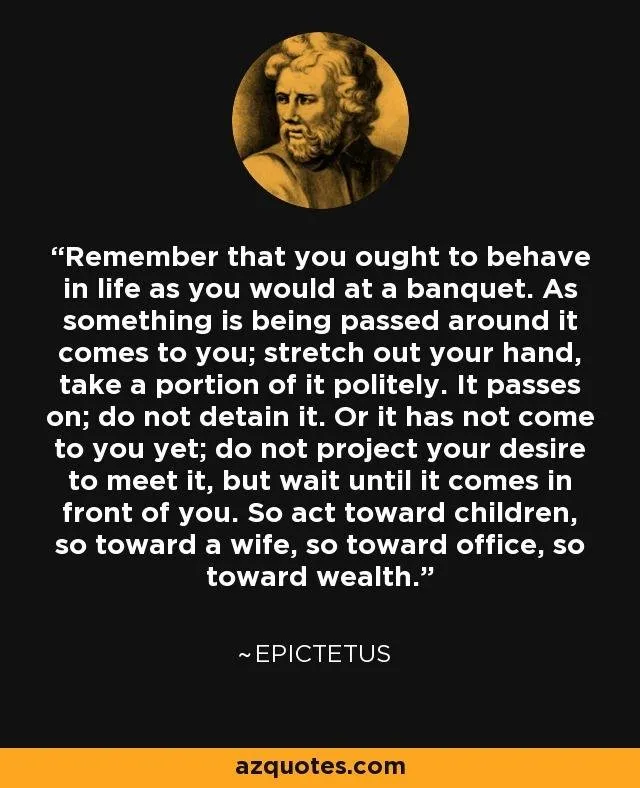
When it comes to your goals and the things you strive for, ask yourself: Am I in control of them or they in control of me?
Like technology (and many other things), are your goals in control of you or you in control of them? You can't let any of these things take over. They all tend to be great slaves but cruel masters.
Marcus liked to point out that Alexander the Great—one of the most passionate and ambitious men who ever lived—was buried in the same ground as his mule driver. Eventually, all of us will pass away and slowly be forgotten.
We're all the same… shits stink, trouser leg on one leg at a time etc. Don't idolise people; respect, admire and emulate if you so wish but no-one is better or worse than anyone else. At certain aspects, sure, but they all return to whence they came in a similar manner.
“When children stick their hand down a narrow goody jar they can’t get their full fist out and start crying. Drop a few treats and you will get it out! Curb your desire—don’t set your heart on so many things and you will get what you need.” —EPICTETUS, DISCOURSES, 3.9.22
Don't be greedy!

It is thought that an animal has self-awareness when it is able to fully recognize itself in a mirror. Perhaps we could say that we begin our journey into philosophy when we become aware of the ability to analyze our own minds.
There's a moment when a young child first sees itself in a mirror and realises its 'separateness' and consciousness of 'other', along with self-awareness. That same process happens when we can analyse our own minds. Then it's time to get to work…
Modern philosopher Nassim Taleb has warned of the “narrative fallacy”—the tendency to assemble unrelated events of the past into stories.
Making patterns where they're not necessarily there. Check out some of Taleb's work in these Threads:
@adambarratt/re-leothreads-zfsdi53w
@adambarratt/re-leothreads-b3na6rpc
Oiêsis, self-deception or arrogant and unchallenged opinion
Another great word and concept, and one to look out for!
Maintain control over your mind and perceptions, they’d say. It’s your most prized possession.
Don't let the demons run amok with all their nonsense in the media and the like.
Jim Rohn’s widely quoted line is: “You are the average of the five people you spend the most time with.” James Altucher advises young writers and entrepreneurs to find their “scene”—a group of peers who push them to be better.
A very common expression, as you are your environment and who you spend the most time with. Are they winners… or not.
The Zen meditation teacher Jon Kabat-Zinn coined a famous expression: “Wherever you go, there you are.”
Always worth remembering. You can travel to distant lands, do all kinds of things, and hang out with all kinds of people… but you will have followed and be right there as the same person.
These things can have an effect for sure, but you can't outrun the true you and you'll need to face yourself at some point if you want to 'do the work'.
This is what Epictetus means about the study of philosophy. Study, yes, but go live your life as well. It’s the only way that you’ll actually understand what any of it means.
Don't be a theorist. Study, yes, but get out there and live practically so you can test and experience things for yourself.
There are two ways to be wealthy—to get everything you want or to want everything you have.
A slight twist in mindset. I think you should always strive for more, but you must appreciate all you already have too. A healthy balance here is what makes a content person.
Business executives try to pursue two different strategies at the same time—straddling it’s called—and they are shocked when they succeed at neither.
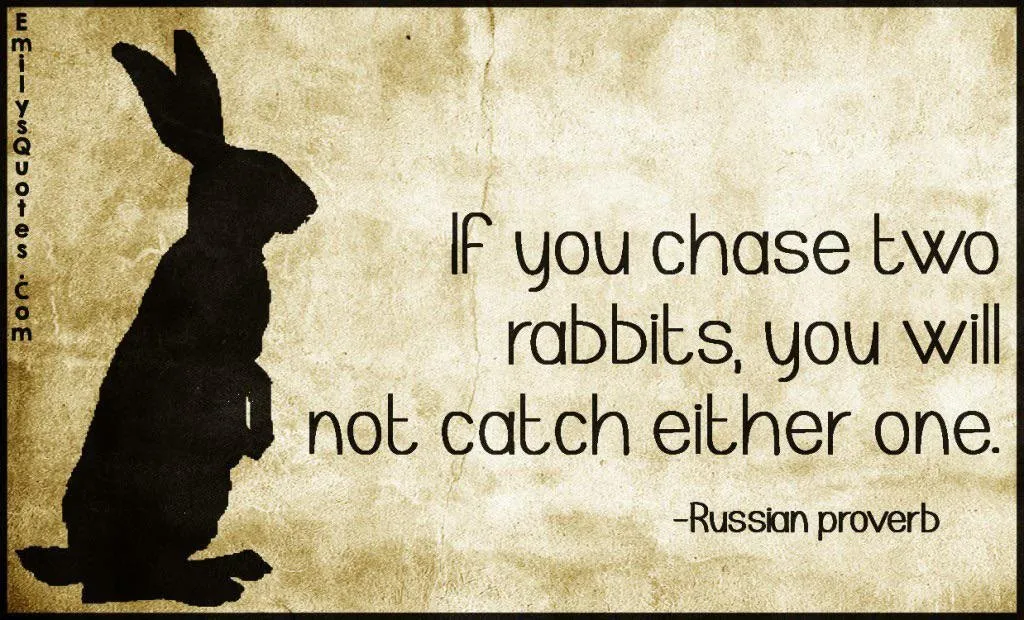
Trust, but verify
Another Russian proverb and/or Ronald Reagan I believe. Either way, by all means trust, but you need to find out for sure for yourself. Always verify.
be willing to learn from anyone and everyone, regardless of their station in life.
Everyone has a story to tell, wisdom to impart. We're all teachers and we're all students… and that goes for every scenario and interaction.
Attention matters—and in an era in which our attention is being fought for by every new app, website, article, book, tweet, and post, its value has only gone up.
Exactly. As talked about at length in Deep Work by Cal Newport.
The foundation of a free country is that your freedom to swing your fist ends where someone else’s nose begins.
An interesting way of putting it. You're free to do what you want until it infringes on the rights of others.
all-or-nothing thinking (also referred to as splitting).
Point is, it doesn't need to be all or nothing, and that's where many of us go wrong.
You have two essential tasks in life: to be a good person and to pursue the occupation that you love.
Probably more than that, but 2 of the most important aspects and worth coming back to again and again through your life.
And the most practiced Stoics take it a step further. Instead of simply accepting what happens, they urge us to actually enjoy what has happened—whatever it is.
Flipping it to actually wanting everything to happen as it does takes things to another level.
You don’t have to believe there is a god directing the universe, you just need to stop believing that you’re that director.
There's a give and take. Who the director is and where you fit in are still big unknowns, Stoically or otherwise.
Benjamin Disraeli: “Never complain, never explain.”
I like this quote. Not a bad philosophy to live by (within reason ;))
amor fati
The love of fate!
But everything is in a constant state of change. We have certain things for a while and then lose them. The only permanent thing is prohairesis, our capacity for reasoned choice.
This speaks for itself. Nothing is permanent except our ongoing perceptions (till the day those too end of course).
The guiding reason of the world—the Stoics called this the logos
Logos is like 'Dharma' or 'grand plan' etc. A certain movement of the universe and things in it that we need to flow with. Of course, some is meant to be flowed with and not fought, and there is much within that that comes into our control and can be directed.
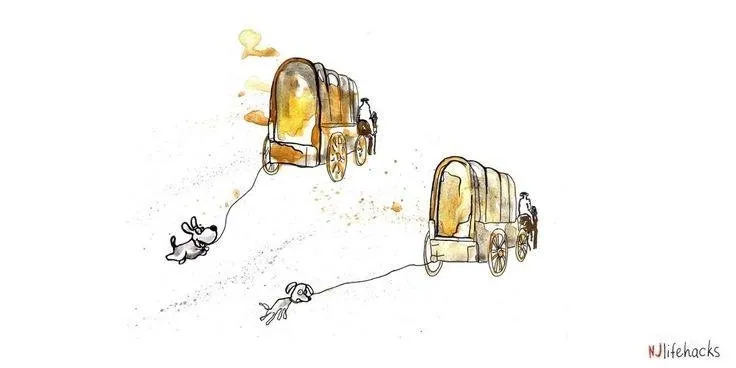
We are like a dog leashed to a moving cart.
One analogy. We're stuck to the cart so have no choice but to go where that goes, but there is a fair amount of leeway within that. The general direction is staying the same but we can go different routes within that, mix up the pace and have influence on how it all goes in that sphere.
At some point, we must put our books aside and take action. So that, as Seneca put it, the “words become works.” There is an old saying that a “scholar made is a soldier spoiled.” We want to be both scholars and soldiers—soldiers in the good fight.
Goes back to taking action and not just reading or talking about it. Be a scholar… but be a soldier… a warrior!
compatibilists
Compatibilism is the belief that free will and determinism are mutually compatible and that it is possible to believe in both without being logically inconsistent. A story for another day…
Thanks Ryan! Anything else?
Great book for all into this kind of thing, and also to anyone else who's never really thought about this subject area.
Bite sized chapters (that's the point) that can be read one each day, or several at a time depending on your mood and preference. And can also be referred back to easily as and when. The sort of book you can have on the go with something else and dip in and out.
Some of the passages themselves are more interesting than others, and Holiday does a good job of his analysis, again some being better or more compelling than others. I suspect each reading you'd get slightly different things out of it.
For sure, a book recommended for all as I can't see anyone not getting at least a nugget or 2 out of it. And it's not too involved as I say, so you can take it as you wish!
'The Daily Stoic' video review:
@adambarratt/re-leothreads-21emucwht
'The Obstacle is The Way' by Ryan Holiday video review:
@adambarratt/re-leothreads-38w6cgv74
'Ego is the Enemy' by Ryan Holiday video review:
@adambarratt/re-leothreads-mghnptoi
First image my own, others linked to source
- 1-50: First 50 BookBabbles
- 51: THE DAILY STOIC - Ryan Holiday
- 52: MAKE TIME - Jake Knapp & John Zeratsky
- 53: GRIT - Angela Duckworth
- 54: WHAT I TALK ABOUT WHEN I TALK ABOUT RUNNING - Haruki Murakami
- 55: THE PURSUIT OF PERFECT - Tal Ben-Shahar
- 56: THE SLIGHT EDGE - Jeff Olson
- 57: CONTAGIOUS - Jonah Berger
- 58: THE RICHEST MAN IN BABYLON - George S. Clason
- 59: THE 5 AM CLUB - Robin Sharma
- 60: THINK LIKE DA VINCI - Michael Gelb
- 61: INFLUENCE - Robert Cialdini
- 62: THE ONE THING - Gary Keller
- 63: THE 12 WEEK YEAR - Brian Moran & Michael Lennington
- 64: THE POWER OF YOUR SUBCONSCIOUS MIND - Joseph Murphy
- 65: THE UNTETHERED SOUL - Michael A. Singer
- 66: ON WRITING WELL - William Zinsser
- 67: PRINCIPLES - Ray Dalio
- 68: HYPERFOCUS - Chris Bailey
- 69: THE OBSTACLE IS THE WAY - Ryan Holiday
- 70: EXTREME OWNERSHIP - Jocko Willink & Leif Babin
- 71: KNOWN - Mark Schaefer
- 72: THE LAST LECTURE - Randy Pausch
- 73: THE FIVE PEOPLE YOU MEET IN HEAVEN - Mitch Albom
- 74: FOUR THOUSAND WEEKS - Oliver Burkeman
- 75: THE ART OF TAKING ACTION - Gregg Krech